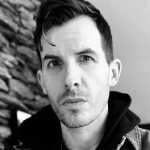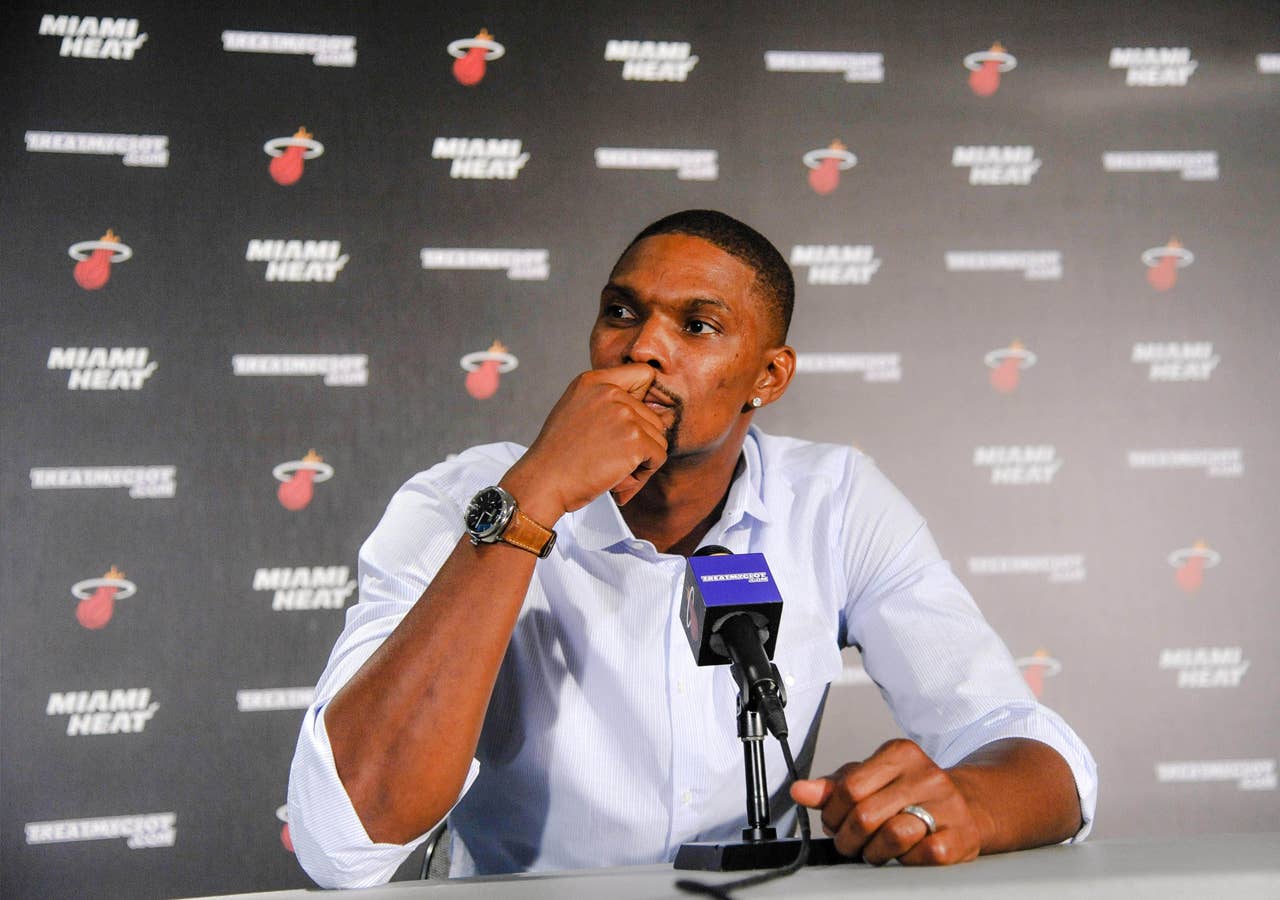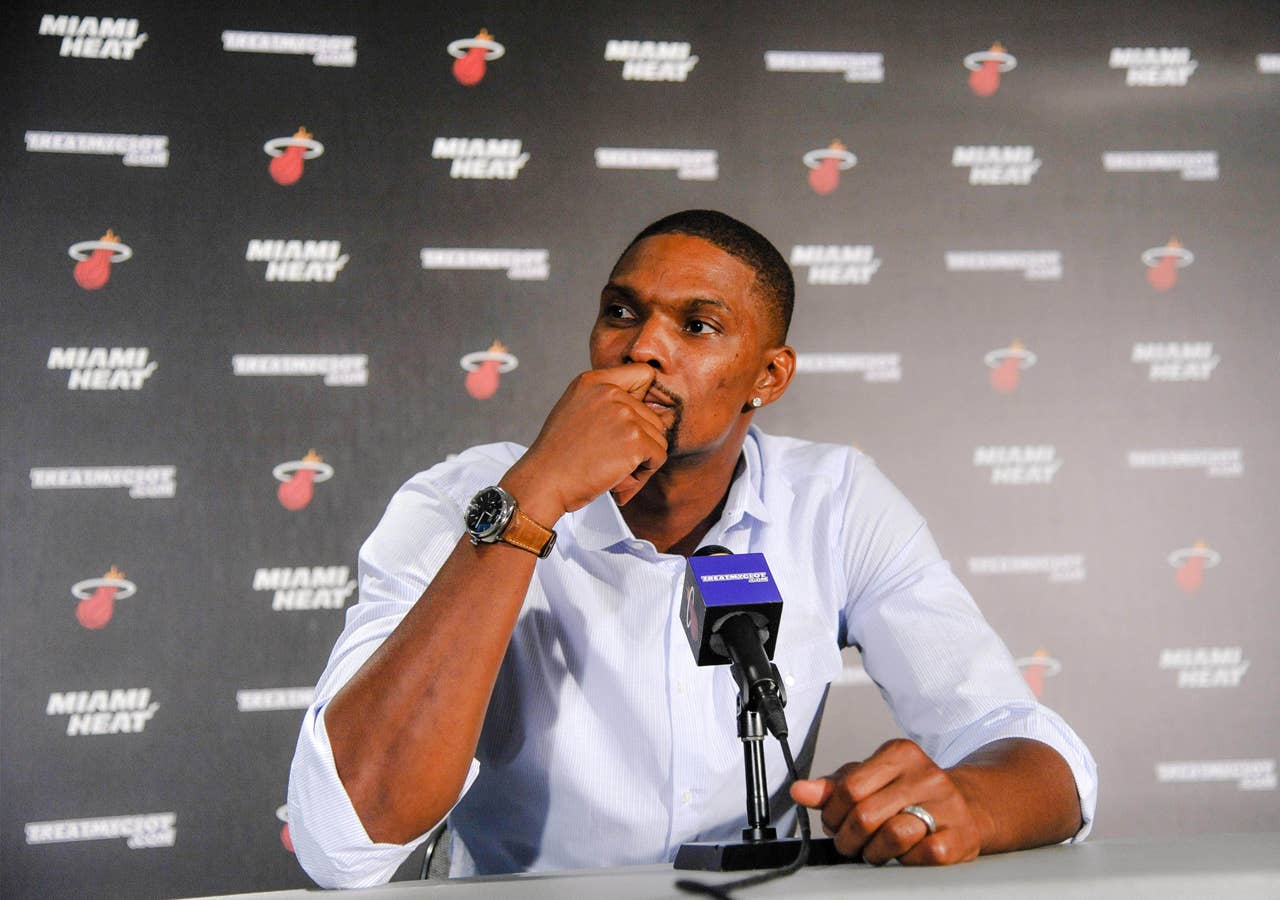
When you go through something like Chris Bosh did last season, it changes you.
Just maybe not in the way you’d expect from a guy that was staring at the possibility of never playing professional basketball again.
“I know a lot of people are always like “What do you have to say?” I’m like, hey man, good days are good,” says Bosh. “They’re like “That’s it?” And I’m like, yeah, what did you expect?”
Bosh insists he’s a “simple guy” so if you thought the Heat forward had a Rust Cohle-like revelation about how the world really works after one hell of a health scare, you’re barking up the wrong tree.
But those days he spent last February propped up in a Miami hospital—fretting over some test results that held the key to his future, legitimately wondering if his career was over—profoundly changed him.
Sweat the small stuff all you want. Bosh is cool.
“Things aren’t as bad as you think they are,” he says. “Each day that you’re healthy, each day that you have a chance to do things that you really love, especially if you’re living out your dream, that’s a good day.”
Bosh had too many bad days last season.
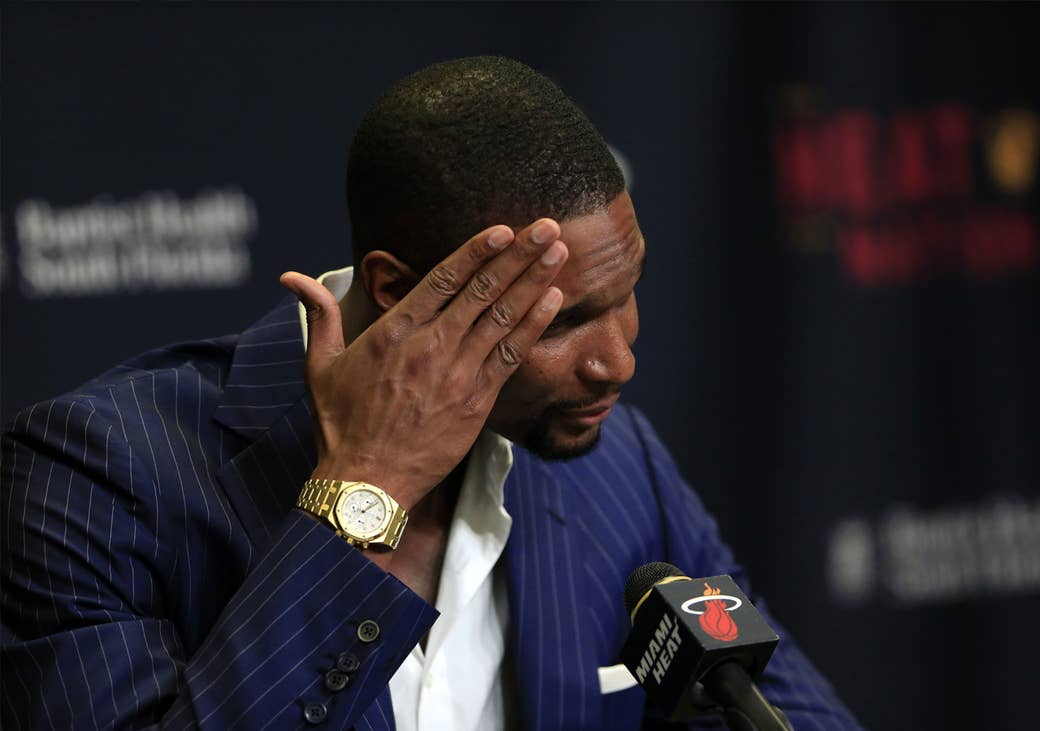
His 12th NBA season officially ended Feb. 19, just days after playing in the All-Star Game in New York. That’s when he was admitted to a Miami hospital after reportedly feeling “under the weather” the day before.
The training staff examined him, but quickly sent him to Heat doctors. Turned out Bosh wasn’t sick but in serious danger.
The post-LeBron James Heat campaign had been up and down affair when Miami rolled into Utah for a December meeting. The Heat was 10-12 when it visited Salt Lake City and at some point during the 100-95 victory, just the second in its last six games, Bosh was kicked in the leg.
Thinking nothing of it other than a typical bump and bruise during one of 82 grueling NBA regular season games, Bosh, out of character, neglected to wear his compression tights on the long plane ride home after the end of a five-game road trip.
“You know sometimes you can get kicked without knowing and the traumatized area that’s where blood and kind of pool up and clot,” says Bosh. “That’s what happened with me.”
Bosh never mentioned the injury to Miami’s trainers. He thought the contusion was nothing. The pain and soreness would eventually subside, he reasoned. But over the ensuing two months, as the wear and tear on his body and all the travel racked up, he kept feeling worse and worse. Those who follow and cover the team on the daily basis commented how Bosh looked increasingly fatigued.
“Athletes, man, we’re built to be tough, we’re supposed to be tough and everything, but you know man you’ve got to be smart,” says Bosh. “Things can kind of get out of hand like they did with me.”

Doctors diagnosed Bosh with a pulmonary embolism-a blood clot that forms in another part of the body and eventually blocks the artery to the lung-and immediately admitted to Baptist Health System Hospital. This was serious. Deadly serious; pulmonary embolisms are responsible for thousands of deaths per year. Fluid that had built up in his lung had to be removed and Bosh was given blood thinners as doctors ran a bunch of tests to determine if his condition was hereditary. That held the key to his future.
“If it was hereditary that means I could have had a reoccurring situation. And that would require me to kind of consistently stay on medication. And, you know, that’s a problem with playing contact sports,” says Bosh.

Ball players aren’t supposed to be on blood thinners because they increase the risk of internal bleeding. You can’t be taking blood thinners and banging with big boys under the basket. One wrong elbow to the torso or hard fall to the hardwood could be life threatening.
Bosh had to wait four or five tense days for the results.
He was back on the court by May. That month he worked out and played with all the young Heat players in Miami before departing to Los Angeles for the summer. Soon enough, many of his teammates would join him out there.
Bosh had never played in less than 57 games in an NBA season so sitting on the bench like he did once he was fully recovered from the hospital stay was eye-opening.
It’s cliché, but the time on the sidelines allowed him to appreciate basketball like never before. Bosh started to notice the crowd. He looked at his teammates differently. His coaches no longer sounded the same. He would switch where he sat on the bench during games because each seat offered a unique perspective and every game he would adopt a new role.
“I sat in the middle, the end, the beginning of the bench. Just heard what different guys say,” says Bosh. “Some days I would be really vocal. Some days I was like a fly on the wall. That just allowed me to see where guys’ heads was at.”
The more he talked to his teammates and the more he embraced his status as one of the Heat’s vocal leaders, Bosh realized he needed to switch things up over the summer.

Living out in Los Angeles during the off-season, Bosh hatched the idea to host his teammates for a West Coast Heat retreat. Dwyane Wade, Udonis Haslam, Hassan Whiteside, Mario Chalmers, Josh McRoberts, and Gerald Green all ventured out to LA in August with Bosh serving as the host. He made sure the group got in all the necessary basketball work while also carving out time to spend together away from the court. Guys were free to do their own thing-no activities were mandatory-but this was about bonding away from the court. He even took the crew out to Joshua Tree.
“I just wanted to connect with guys and talk to guys and you know be able to get outside of our elements a little bit and just talk to each other in a different place,” says Bosh. “It makes for great conversations. We went to some incredible places.”

It was also strategic. In his sixth season with the Heat, Bosh is taking on yet another role, one he’s still adjusting to. With a new starting five and a few other fresh faces coming off the bench, Bosh’s voice carries more weight than ever. That means pushing guys in ways he never has.
What it doesn’t mean is automatically becoming the Heat’s go-to scorer. He might be Miami’s highest paid-player, but Bosh, at 31, isn’t expected to score 25 PPG. He has too many other responsibilities to worry about getting his shots.
“I need to be a facilitator. I need to be a defender. I need to be a rebounder. I need to be a scorer. I pretty much need to be able to do everything with this team, all at the same time being vocal on the court and in the locker room,” says Bosh. “I’m still trying to get a feel for what that means. Once I figure it out it’ll be good.”
That’s basically the job description of every franchise player. Wade, at 33 years old and with as many basketball miles on his balky knees as just about anyone in the NBA, isn’t that kind of player anymore.
Sports Illustrated wrote that Bosh needs to be the Heat’s “best player if they are to make any noise in the East.” He isn’t buying it.
“I don’t want to get caught up in who is the best player and who should be doing what. I do need to be at my best for us to be great, you know,” says Bosh. “I take that responsibility and like I said before, I know a lot of people take that as a ‘He has to get 20 points a game, you’ve got to do this and that.’ I need to do what we need to get done to win that night.”
"we can easily be a five, six, seven seed and underachieve. We can just do that showing up."
—Chris Bosh
Last year he led the Heat with 21.1 PPG, the first time he averaged more than 20 a game for Miami. Is that what the 2015-16 Heat needs from him? At least 20 per from the man trying to lead a team that features as much talent as it does questions about how the pieces fit?
“Yeah, I can. I’ve done that before,” he says. “But I don’t think we’ll be at your best if I’m constantly, you know, just trying to get good shots.”
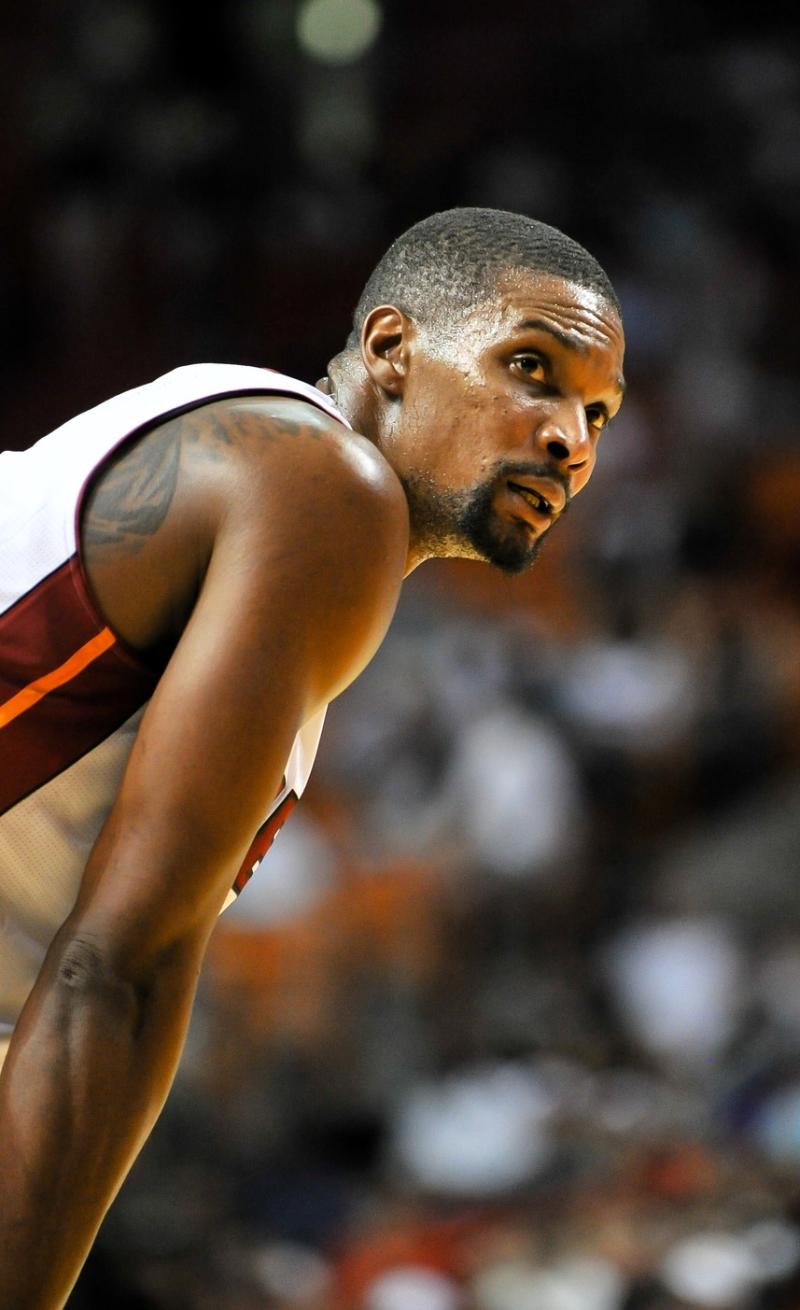
Motivation certainly won’t be an issue this year like it was last year. In September, Bosh copped to the fact that he was “lacking a little bit of passion” at the beginning of last season. After four straight Finals appearances-essentially an extra season worth of the most intense basketball imaginable-it caught up with him.
“I was tired, man,” says Bosh. “That run you get beat down, for whatever reason you don’t appreciate the game as much as you do. And you can kind of take some things for granted. We had played the most basketball out of anybody in the last four years and that’s how it was. It got the best of me.”
There was also a LeBron hangover. And, honestly, how could there not be when you lose the world’s best player? The Heat spent almost the entire season hovering below .500 without James and missed the playoffs for the first time since 2008.
“That kind of loomed over everybody,” says Bosh. “Then we kind of got caught scrambling a little bit. In my new role last year I wasn’t prepared. I don’t think me or Dwyane were prepared. We tried to salvage it. We tried to do the best we could do. There’s only so much we could do.”
Team president Pat Riley eventually got them some help, acquiring PG Goran Dragic at last year’s trade deadline. Signed during the off-season, Dragic will team with Luol Deng in the backcourt along with a re-uped Wade, Whiteside and Bosh to form a formidable starting five in the Eastern Conference. The experts have pegged the Heat anywhere from the second to the fifth best team in the East. A return to the postseason is expected and nothing to get excited about.
“That for us is average. You can be an eight seed and we won’t be satisfied with that,” says Bosh. “Even with home court we won’t be satisfied with that. We want to advance and we want to compete. Can we compete for a championship? Absolutely.
“With that being said, we can easily be a five, six, seven seed and underachieve. We can just do that showing up. We need to push ourselves every night and do the hard things, put stress on ourselves, so we can compete.”

The tests, of course, came back negative for any kind of hereditary condition. But the whole episode has forced Bosh to take all kinds of precautions. Now he’s always wearing his compression tights. He tries not to sit down for long periods of time. He’s up and moving every hour “just to keep the blood pumping” and takes “a little baby aspirin before every flight,” he says.
Eight weeks after he was discharged from the hospital, Bosh was given the clearance to start resuming physical activities. First he hit the weights before doctors cleared him to run. Those first few days back in the gym were just brutal. “Good old fashioned suffering,” he called it.
Surprisingly, the Heat trainers and Bosh’s doctors did not recommend any new regimens to whip him into shape, nor did they rule out any specific activities. They allowed him to gradually build his body back up and work his way to the court.
“That was one thing I learned is that you can have all facts in the world and the best trainers but you still kind of have to go through that pain to get to where you need to go,” says Bosh.
There are good days. There are bad days. And there’s a really big difference between the two. Bosh learned that the hard way and he believes he’ll be a better player, leader, and person because of it.
“I really didn’t know what a bad day was until I had a really bad day,” he says.
